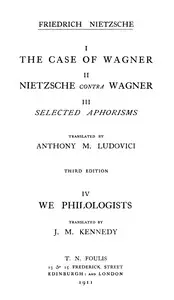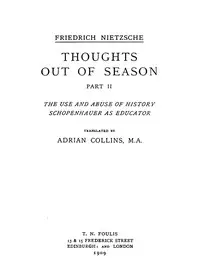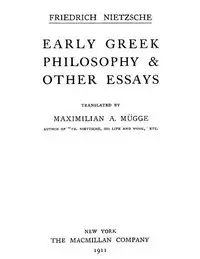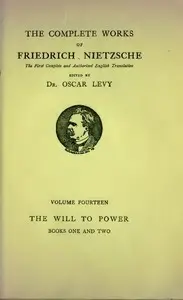"Thoughts Out of Season, Part I" by Friedrich Wilhelm Nietzsche examines German culture and moral ideas in the context of people like David Strauss and Richard Wagner. Think about victory's effects and cultural satisfaction and also questions how valuable German culture really is after the war. The book starts with worries about Germany after it beat France in the war, saying that winning can make people too comfortable instead of helping them grow as a culture. He believes that superficial wins are praised too much, and this could stop Germany from building a real culture. Nietzsche mentions that people who think they are cultured are actually stopping true cultural growth; he uses Strauss to point out the flaws in how people think, saying that many Germans care more about their status than about deep thinking and art. This leads into discussions about culture, art, and what people need to do in a society choosing comfort instead of truly facing life's difficult questions.

Thoughts out of Season, Part I
By Friedrich Wilhelm Nietzsche
After a significant triumph, society risks complacency, potentially mistaking superficial achievement for profound cultural advancement.
Summary
About the AuthorFriedrich Wilhelm Nietzsche was a German classical scholar, philosopher, and critic of culture, who became one of the most influential of all modern thinkers. He began his career as a classical philologist before turning to philosophy. He became the youngest person to hold the Chair of Classical Philology at the University of Basel in Switzerland in 1869, at the age of 24, but resigned in 1879 due to health problems that plagued him most of his life; he completed much of his core writing in the following decade. In 1889, at age 44, he suffered a collapse and afterward a complete loss of his mental faculties, with paralysis and probably vascular dementia. He lived his remaining years in the care of his mother until her death in 1897, and then with his sister Elisabeth Förster-Nietzsche. Nietzsche died in 1900, after experiencing pneumonia and multiple strokes.
Friedrich Wilhelm Nietzsche was a German classical scholar, philosopher, and critic of culture, who became one of the most influential of all modern thinkers. He began his career as a classical philologist before turning to philosophy. He became the youngest person to hold the Chair of Classical Philology at the University of Basel in Switzerland in 1869, at the age of 24, but resigned in 1879 due to health problems that plagued him most of his life; he completed much of his core writing in the following decade. In 1889, at age 44, he suffered a collapse and afterward a complete loss of his mental faculties, with paralysis and probably vascular dementia. He lived his remaining years in the care of his mother until her death in 1897, and then with his sister Elisabeth Förster-Nietzsche. Nietzsche died in 1900, after experiencing pneumonia and multiple strokes.

















